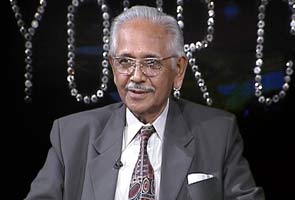Justice Verma: An Exceptional Career
Justice Jagdish Sharan Verma was the architect of a report that became instrumental in shaping a new, stronger anti-rape law in the country.

NDTV April 23, 2013
New Delhi: Justice Jagdish Sharan Verma was the architect of a report that became instrumental in shaping a new, stronger anti-rape law in the country.
The retired Chief Justice of India was appointed to head the three-member panel that drew the blueprint of the new laws immediately after the brutal gangrape of a medical student in a moving bus in Delhi shook the nation’s conscience.
In a country where panels and commissions have been known to take years and many extensions to complete assignments, Justice Verma’s panel submitted its 630-page report in a record 29 days. The 80-year-old former judge then challenged the Indian government to hold up its end of the bargain and bring a tougher law in the next Parliament session. That session is still on.
On April 15, Justice Verma and his panel were awarded the justice for women award at the NDTV Indian of the Year Award 2012.
The new anti-rape laws crowned a career full of important milestones in India’s legal system. Justice Verma’s first landmark judgement for women’s rights came in the famous Vishakha case of 1997, when the Supreme Court bench headed by him laid guidelines to prevent harassment of women at work.
The Verma bench observed that sexual harassment at work violates a woman’s right to equality at the workplace and so her constitutional rights.
In the Ayodhya land dispute, he ruled that acquiring the property of a mosque did not constitute an abridgement of a Muslim’s right to freedom of religious belief and practice.
In 1996, while setting aside the Bombay High Court verdict scrapping the election of Shiv Sena leader Manohar Joshi to the Maharashtra Assembly, Justice Verma famously said that Hindutva depicted “a way of life which cannot be assumed to mean and be equated with narrow fundamentalist Hindu religious bigotry”.
As Chief Justice of India, Justice Verma heard the Jain Hawala case in which it was held that notings in a diary containing initials of some people did not amount to a piece of evidence.
Justice Verma also did not hesitate to turn the mirror on his own fraternity when he favoured a separate mechanism to make High Court and Supreme Court judges accountable for misconduct.
He was Chief Justice of India from March 1997 until his retirement in January 1998. Justice Verma also served as the chief of the National Human Rights Commission and was the first head of the News Broadcasting Standards Authority.
http://www.ndtv.com/article/people/justice-verma-an-exceptional-career-357563

